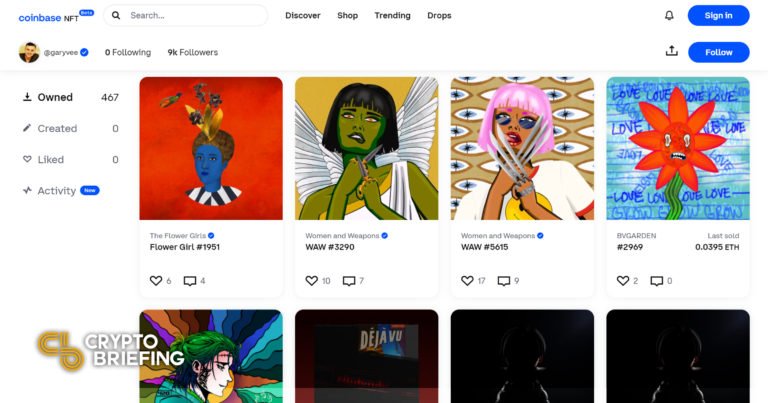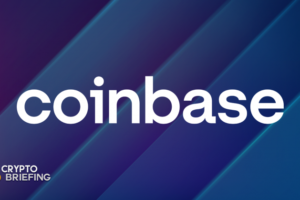
Key Takeaways
Coinbase NFT has failed to gain any significant traction in the three months since it launched.
Since launching on Apr. 20, the NFT marketplace has done about $37,000 in average daily trading volume, or about 2,000 times less than its largest competitor, OpenSea.
Over the same period, Coinbase NFT has attracted only about 8,668 users in total.
Share this article
Coinbase has one product that’s performing even worse than its sluggish stock: its NFT marketplace.
Coinbase NFT Flops
Three months in, Coinbase’s NFT platform is proving to be a complete failure.
The largest U.S.-based cryptocurrency exchange and one of the industry’s oldest centralized marketplaces seems to have completely botched the launch of its social marketplace for non-fungible tokens, Coinbase NFT.
OpenSea vs LooksRare vs Coinbase NFT daily trading volume chart (Source: Dune)
According to open-source crypto data provider Dune, Coinbase NFT has recorded only about $2.9 million in trading volume since launching on Apr. 20, setting its average daily volume at around $37,000. To put that into perspective, the largest NFT marketplace in the space, OpenSea, has seen over $5.9 billion in trading volume over the same period. LooksRare, which launched soon after the NFT market topped in January, has registered about $2.53 billion in trading volume. In the last 24 hours, Coinbase NFT has recorded only 6.1 ETH, or about $7,200, in trading volume.
While the exact reasons for Coinbase’s apparent failure are difficult to pinpoint, arriving months late to the NFT bull cycle (and four months after it planned to launch), spotlighting dubious NFT projects like MekaVerse (a once-hyped collection that was accused of rigging its drop and ultimately tanked), and gating the platform’s launch certainly didn’t help.
Coinbase launched its NFT marketplace in hopes of attracting the masses and differentiated itself from its competitors by styling itself as the “Web3 social marketplace for NFTs.” However, it appears that the product arrived too late for anyone to care. By the time the exchange released the product’s beta version in April—at least four months later than promised—the NFT market was already well on its way down to reach the same trading volume it had before the bull run in NFTs even started.
The best month to date for NFTs was January, when the total monthly trading volume topped about $17.1 billion. That’s more than the total trading volume recorded since Coinbase NFT launched. While interest in NFTs was free-falling, Coinbase took the decision to gate the platform’s release to a limited number of waitlisted users upon launch, likely hurting its adoption prospects in the process. Pre-launch, the platform had about four million users waiting in the queue to try it, while today it has registered only about 8,668 users in total.
Despite launching five full years before the now largest cryptocurrency exchange in the world, Binance, and seven years before its speedily encroaching competitor, FTX, Coinbase has started to lose its industry relevance and market share over time. While the exchange went public on Nasdaq in April 2021 in what was described as a “watershed moment” for the crypto industry, its stock has since plummeted amid a shaky macroeconomic environment, trading about 84% off its high at $51.71. The botched launch of its NFT marketplace “for social engagement” is only adding to its downfall, setting the company back millions of dollars with barely anything to show for it.
Disclosure: At the time of writing, the author of this article owned ETH and several other cryptocurrencies.
Share this article
The information on or accessed through this website is obtained from independent sources we believe to be accurate and reliable, but Decentral Media, Inc. makes no representation or warranty as to the timeliness, completeness, or accuracy of any information on or accessed through this website. Decentral Media, Inc. is not an investment advisor. We do not give personalized investment advice or other financial advice. The information on this website is subject to change without notice. Some or all of the information on this website may become outdated, or it may be or become incomplete or inaccurate. We may, but are not obligated to, update any outdated, incomplete, or inaccurate information.
You should never make an investment decision on an ICO, IEO, or other investment based on the information on this website, and you should never interpret or otherwise rely on any of the information on this website as investment advice. We strongly recommend that you consult a licensed investment advisor or other qualified financial professional if you are seeking investment advice on an ICO, IEO, or other investment. We do not accept compensation in any form for analyzing or reporting on any ICO, IEO, cryptocurrency, currency, tokenized sales, securities, or commodities.
See full terms and conditions.















